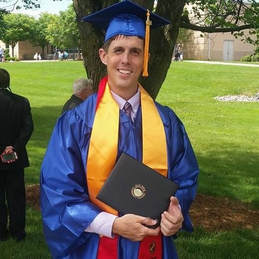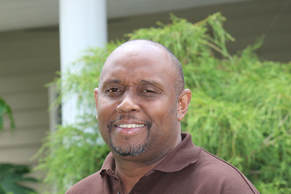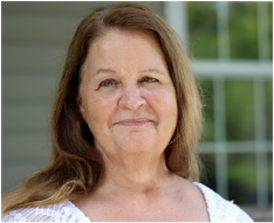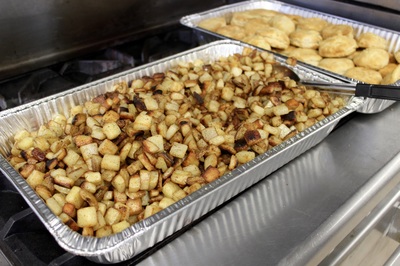|
What Are They Up To Now? Former Resident Spotlight  Former resident, Ryan Kirby Former resident, Ryan Kirby In 2002, Ryan Kirby sustained near fatal injuries in a car accident that left him with a significant addiction to prescription painkillers and eventually led him to crime as a way to support his $600 per day habit. He was incarcerated in 2004, served 8 years, and then enrolled in Gemeinschaft Home’s program upon his release in 2012. Over the last four years, Kirby has taken his life in an entirely new direction. Originally from Northern Virginia, Kirby decided to settle in the Shenandoah Valley, finding steady work for a local manufacturer, buying a house, and recently graduating with a degree from Blue Ridge Community College. While at first reluctant to come to Harrisonburg, Kirby acknowledges that his experience at Gemeinschaft Home marked a significant turning point, one that gave him tools to grow and to move his life in a positive direction. He is now an advocate for programs like Gemeinschaft Home and dreams of one day becoming a counselor for released prisoners and individuals with drug addictions. What Are They Up To Now? Former Resident Spotlight  Former resident, Brian Kyle Former resident, Brian Kyle When Brian Kyle arrived at Gemeinschaft Home in the spring of 2015, he started out with the philosophy, “I made it, and I’ll keep on making it.” Without the added benefit of a strong family support structure, Kyle soon realized that the power to make a change in his life rested solely on his shoulders and that Gemeinschaft Home would provide him with the necessary tools. Throughout his time in the program, Kyle maintained regular employment, walking nearly 8 miles (round-trip) every day to work at Taco Bell. The journey was not easy, but Kyle refused to adopt a focus of negativity, living by his personal motto: “something better is going to happen.” During this time, Kyle was also searching for full-time employment, without much luck, until his final day in the program. That day Kyle received a phone call from a local roofing company, offering him a position. Now, he lives and works in the area, demonstrating on a daily basis what’s possible for Gemeinschaft Home residents who choose to make the most out of the opportunities afforded by the program. Former resident, John Butler, Jr., returns to Gemeinschaft Home—this time as an employee.  Residence Life Coordinator, John Butler, Jr. Residence Life Coordinator, John Butler, Jr. The sound of his voice often precedes him, as residents and staff encounter John Butler, Jr., Gemeinschaft Home’s new Residence Life Coordinator, and its deep tone resonates all of the warmth and grace of the man himself. Whether he is leading a group session or having an impromptu conversation in the hallway, Butler embodies a gentle aura that is both authentic and powerful. Butler began work in this position last June, but his journey at Gemeinschaft Home began almost thirteen years ago, when he arrived as a resident. “I came here from prison in 2003. I got here the day after Christmas. It was what I needed at the time, and that is why I am still here,” Butler explains, pointing to his experience in the program as the watershed moment in which he chose another path. “I went to prison twice and had an active addiction for over thirty years. I got to the point where everything that I believed in was a lie,” he says. The major difference he observes in his perspective today is that “I believe in the impossible. The impossible in this situation being the idea that a prisoner can never return to mainstream society and live a positive and productive life.” He is proof that the impossible is indeed possible, after all. He embodies a real and present example for residents in the program. He enacts a different way of being in the world, and has the ethos “to embrace others on the same road,” he says, because he has shared so much of their past experiences. On prison life, Butler explains, “When you continuously have someone in control of the light switch and water valve and all movement, it produces a certain amount of stagnation. Prisoners don’t have to worry about anything, and when they get out of prison, they don’t know how to handle it.” He adds, “We need help a lot of times to take a look around and realize what we’re doing and the next thing we need to do.” Butler argues that the strength of Gemeinschaft Home is in its capacity to provide residents with learning experiences and tools for living that enable them to adjust to life beyond incarceration. Part of that mission involves instilling an ethic of care for others and a sense of accountability for one’s own actions. “Having genuine concern and empathy was a big learning experience for me,” he says, reflecting on his time as a resident in the program. Butler completed a six-month program in 2004, and, after settling in the local area, he never stayed too far away from Gemeinschaft Home. With expertise in maintenance work, Butler found employment and housing, joined a church, and established new friendships, but it seemed as though something was absent from his life. He explains that “I was good at my work, and I made good money, but it wasn’t who I am, because my heart wasn’t giving back. It’s in my heart to reach out to people to show them the way.” Over the last decade, Butler gradually has become more involved in the organization, both on a volunteer and paid basis, and he has served on the board of directors. Butler has also become active in other community-based initiatives as well. For example, he is president of Virginia 21, a nonpartisan organization that raises awareness about voting issues and monitors ongoing discussions in congress, the general assembly, and among local delegates. Butler’s interest is significant and personally relevant, because as a convicted felon in the Commonwealth of Virginia, he lost his privilege to vote. The right can be restored for ex(offenders), but only through a complicated application and approval process. Butler was released more than thirteen years ago, but he has only recently been given back the right to vote. Now in a full-time position Butler’s work for the organization involves a variety of roles, and, in part, involves communicating with representatives from the Virginia Department of Corrections (DOC) to determine whether referred applicants are eligible for the program and to facilitate the transition of new residents from prison to Gemeinschaft Home upon their release. However, most of his job focuses on residents currently in the program, and his approach is the same with an individual one-on-one as it is in a larger group setting: “Let’s work our way through this together.” He advises residents to be realistic in their expectations and emphasizes that “we are not going to be who we want to be overnight.” Butler strongly advocates for the creation of more re-entry/transition programs, and he challenges the common usage of the word “halfway house,” as it applies to Gemeinschaft Home, stressing, “Halfway house is not good enough. Half is not good enough. We need to have a successful completion of the transition for them to successfully go on with their lives.” Down the road, Butler hopes to become director at a sister or brother facility that is connected to Gemeinschaft Home. As he now reflects on his past experiences, Butler stresses, “All I wanted was to be clean, sober, and able to make a difference—and that is what I did,” crediting Gemeinschaft Home for the opportunity to do so. Brenda Leigh provides Gemeinschaft Home residents with family-style meals, made daily from scratch with fresh, high-quality ingredients.  Food Services Manager, Brenda Leigh Food Services Manager, Brenda Leigh The sweet and savory aromas of home cooking quickly envelope the senses of anyone who walks through the front doors of Gemeinschaft Home in the early afternoon. Dinner is served daily at 4PM, but the irresistible scents that reach into every corner of the house often lure residents to the dining area earlier. Even some of the administrative staff members, whose offices are located on the first floor of the house, admit to venturing back into the kitchen periodically in search of one fragrance or another swirling in the air. Food manager, Brenda Leigh, established the practice of preparing fresh, home-cooked meals for residents, when she joined the Gemeinschaft Home staff just over three years ago. At first, Leigh took charge of the kitchen on a temporary basis, and she characterized her role at that time as just “helping out” the organization while they hired someone to fill the position. However, shortly thereafter, she was offered the job permanently, and the Gemeinschaft Home community has enjoyed the benefits of her culinary skill ever since. Leigh, who is known affectionately among the residents as “Ms. B.”—not just because her first name begins with the letter B, but she is often seen “as busy as a bee around the kitchen,” according to one former resident—is not professionally trained in the culinary arts, but she brings a wealth of experience to her work at Gemeinschaft Home. Much of her skill comes from her past work in the food industry, the lessons she learned as a child in her grandmother’s kitchen, and the years she spent raising children and preparing family meals. Because the residents’ work schedules differ greatly, and many are at their job locations during breakfast and lunchtime, Ms. B. prepares brown-bag meals for residents each day as well, and she maintains a well-stocked cupboard for residents (who cook for the house on the weekends) to prepare meals. Ms. B.’s commitment to the wellbeing of the residents is most evident in her philosophy of soul food. To her, having access to good food is an integral part of the life recovery program at Gemeinschaft Home. The majority of residents arrive with at least one year of prison food behind them, and she argues that a little taste of home can help to ease some of the anxiety and stress that many individuals experience upon leaving prison. Prior to her arrival three years ago, residents consumed meals prepared mostly from pre-packaged, processed, and frozen ingredients, but Ms. B. saw an opportunity to give residents tastier, more nutritious foods, including many of her own recipes as well as those shared by residents—“They teach me!” she proclaims proudly. Her reputation is well known among some prospective residents, who have heard about her home-cooked meals from their friends or acquaintances who have lived at Gemeinschaft Home. Ms. B. stresses that good food is healing for the soul, and she points out that no matter what issue an individual resident may face, he knows that he will eat well today and every day he lives at Gemeinschaft Home. In addition to the daily meals, Ms. B. also prepares special dinners on major holidays such as Thanksgiving, Christmas, New Years Day, and Easter. The gratitude from residents is readily apparent, according to Ms. B., who claims she often hears comments such as “This tastes just like my mom used to make!” or “This is the same way my grandmother made it!” While she has made more money working in other positions, Ms. B. says that no other job has ever been as rewarding. The residents make her job worthwhile, and she is happy to contribute to their success in the program. While she knows that residents have a long journey ahead of them, with a number of issues confronting them, she asks herself, “If I were in their shoes, how would I want to be treated?” The answer can be found in the main ingredient of her cooking—love—and she always dishes out an extra helping. |
Archives
August 2023
|


